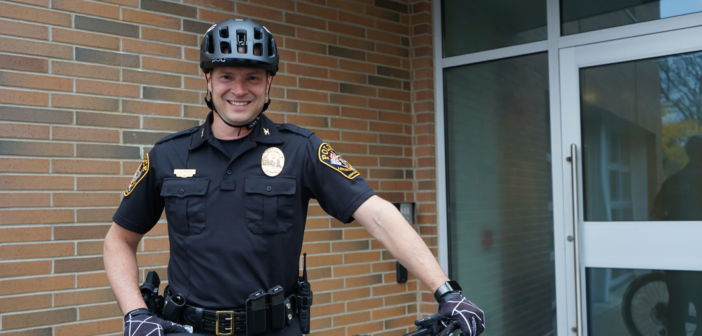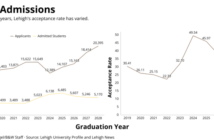In his first interview with The Brown and White, Chief Jason Schiffer of the Lehigh University Police Department said the greatest challenge as police chief will be “gaining the respect of the student body. I’d like to make an influence on all of the lives of all of the students that are here and a positive influence.”
It’s been almost two years since he took over from former Chief Edward Shupp in the beginning of 2018.
Since then, Schiffer has made changes on campus and has formed a relationship with Lehigh.
“I feel like we’re in a good place,” Schiffer said. “I think I have some really good interactions with students on a regular basis… Whenever someone requests to meet with me, I do everything I can do to accommodate those requests, being as open and honest as I can with whatever questions may be presented.”
Olivia Anderson, ‘20, has been at Lehigh since before Schiffer joined the community, and has worked with him numerous times through her role as the co-president of Peer Health Advisors and a member of Student Senate.
Before Schiffer, “the police were considered very unapproachable and an entity to be feared,” Anderson said, which she believes was due to the string of citations being handed out to students.
The amount of liquor law arrests and hospitalizations among students has significantly decreased since the beginning of Schiffer’s tenure, which he credits back to the students.
“The students are the ones behaving in a manner that is not putting their safety in jeopardy…I think there are so many factors, and there’s a lot of effort across campus for education and awareness for overconsumption,” Schiffer said. “We’ve changed the philosophy internally for how we are going to deal with students. We don’t have a zero-tolerance policy.”
Another factor he believes has led to this decrease was the enactment of the Timothy J. Piazza Antihazing Law, which was signed into Pennsylvania law in October 2018. Schiffer said he believes it helped clarify for students the purpose of and when to use medical amnesty.
Schiffer said since he first started as chief up to this year, the number of medical amnesty cases has been significant.
“It’s a never-ending effort, but I’m really pleased with the reduction of hospitalizations,” he said. “I wish the number was lower than it is, but I’m happy to see we’re trending in the right direction.”
Anderson said she has seen a significant change in the way students react to the LUPD since her freshman year.
Students are using the HawkWatch app, and they view the police presence more positively, Anderson said.
“Ever since Chief Schiffer became the police chief, he has created an open line of communication between the students and LUPD,” Anderson said.
With a national increase of school shootings, Schiffer has made an effort to educate everyone on campus on how to handle emergencies and keep them safe, no matter what threat is presented.
In October, LUPD partnered with the Bethlehem Police Department in an active threat training course, an innovative approach to provide the best response possible for students, faculty and staff.
“If there’s an emergency here on campus, our student population is largely going to look to the closest person in a position of authority, which very well may be a professor in the middle of a class,” Schiffer said. “If we don’t educate those faculty members on what they could or should be doing in an emergency, there could be serious failures, so there’s a lot of effort right now to ensure that the largest portion of our faculty and staff are well trained.”
As a former chief of the Bethlehem Police Department, and someone who has worked for the city for over 20 years, Schiffer has seen the change in the relationship between Lehigh and Bethlehem from both sides. He said he recognizes that President John Simon has made a remarkable change, especially since he formed a relationship with Bethlehem Mayor Robert Donchez.
Schiffer said his understanding of the Bethlehem community has led him to advocate for off-campus parties at Lehigh to be moved back on campus.
“I have a lot of concerns about the social activity that takes place off campus, just from the perspective of the amount of foot traffic on city streets or if people would be driving,” Schiffer said. “I think the annoyance factor of loud music and garbage is a by-product of social gatherings in a community, where there are people who might have to work the next day or get up for school the next morning. That generates a whole lot more complaints than that same type of behavior might generate if it were on campus.”
He recently worked with the Interfraternity Greek Council to plan safe on-campus parties for students to celebrate Halloween, and has been involved in many other groups at Lehigh.
Julia Adamson, ’20, the co-chair of Student Senate’s health and wellness committee, said she thinks Schiffer has done an effective job in engaging with student groups and rebuilding the relationship between students and the police.
“I think he’s changed the face of LUPD, where now they are viewed as more of a friendly face to go to in a time of need, instead of something to be feared,” Adamson said.
While this mindset is a priority of Schiffer’s, he said this may be more difficult as Lehigh plans to add more students to its population as part of the Path to Prominence initiative.
Schiffer said LUPD needs more resources to make interactions with students and responses to their needs possible.
“There is no doubt a higher population will put more of a demand on us, so my desire is that we continue to improve the amount of service we can provide and the positive interaction we can have with students, Schiffer said. “I think we can only have that if we’re not so busy that we’re always running from one call to the next.”






Comment policy
Comments posted to The Brown and White website are reviewed by a moderator before being approved. Incendiary speech or harassing language, including comments targeted at individuals, may be deemed unacceptable and not published. Spam and other soliciting will also be declined.
The Brown and White also reserves the right to not publish entirely anonymous comments.